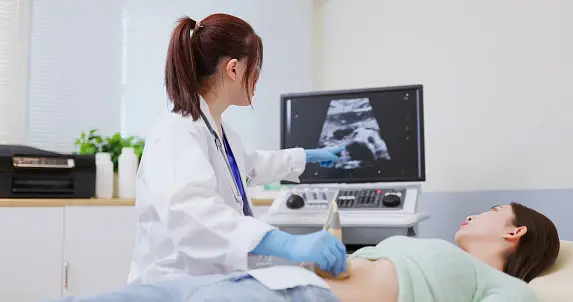Colorectal cancer (CRC) is the term for cancers that originate in the colon (large intestine) or rectum, which are located near the end of the digestive tract. CRC is the third most frequent type of cancer worldwide. It’s also the second most common cause of cancer-related mortality, and among Americans under 50, it’s becoming more common.
If detected early and treated with surgery, colorectal cancer has an around 90% five-year survival rate. The first course of treatment is surgery. Chemotherapy and radiation therapy are further choices. Eliminating every cancer cell and reducing the likelihood of cancer returning are the objectives.
Typically, colorectal treatment entails collaboration with a group of experts that includes the following:
- Gastroenterologist: Treats digestive tract conditions
- Colorectal surgeon: Treats colon and rectal conditions surgically
- Surgical oncologist: Treats cancer surgically
- Medical oncologist: Treats cancer with medications
- Radiation oncologist: Treats cancer with radiotherapy
Table of Contents
1. Surgery
The mainstay of treatment for colorectal cancer in all stages is surgery. Frequently, it suffices for stage 0 CRC. Surgical alternatives consist of:
- Excision: By inserting an endoscope—a tube with a light and a cutting tool on the end—into the rectum, the surgeon eliminates the tumor. Very early stages of cancer may benefit from this surgical procedure.
- Resection with anastomosis: After removing the tumor and surrounding tissue, the surgeon reconstructs the colon using healthy sections. What was eliminated is compensated for by the remaining colon. Cancer stages 1-4 may benefit from anastomosis.
- Resection with colostomy: In this kind of surgical resection, the physician creates a stoma—an incision on the exterior of the body—so that waste can pass through it. The waste gathers around the stoma in a bag. If the surgeon is unable to rejoin the two parts of the colon after the tumor has been removed, a colostomy is performed. Based on the extent of colon removal, the colostomy bag could be either permanent or temporary.
Side Reactions
Following colon or rectal surgery, some possible side reactions include:
- Bleeding
- Infection
- Blood clots
- Stomach discomfort or edema brought on by leaks or scar tissue adhesions (which cause organs and tissue to adhere to one another)
- Colostomy (temporary or permanent)
2. Radiation Therapy (Radiotherapy)
An other local therapeutic option is radiation therapy. Similar to surgery, its focus is on individual tumors rather than cancer affecting the entire body. Radiation therapy kills cancer cells by using high-energy waves. This treatment is more frequently used for rectal cancer, and it may work better when combined with chemotherapy (chemoradiation).
An internal radiation treatment involves a physician inserting needles, seeds, wires, or catheters—a radioactive material—directly into or close to the cancer. Utilizing a machine, external radiation directs X-rays or other radiation toward the bodily part that is malignant.
One possible application for radiotherapy is:
- Preoperatively (neoadjuvent treatment), in order to minimize tumor size and facilitate operation
- Following surgery (adjuvant therapy), to eradicate any residual malignancy
- To eliminate cancer cells that may go undetected throughout surgery
- If you are not well enough to undergo surgery, to stop the cancer from spreading
- To ease CRC cancer symptoms
- In order to treat cancer that metastasizes
Side Reactions
Radiation therapy adverse effects that could occur include:
- Skin irritation at the site
- Nausea
- Fatigue
- Scarring
- Bowel incontinence
- Rectal or bladder irritation
3. Ablation or Embolization
Additional local therapeutic options include embolization and ablation. These operations can aid in the treatment of malignancies that have metastasized to the liver or lungs. Ultrasounds and computed tomography (CT) scans are two medical imaging techniques that assist in guiding extremely thin probes through the skin to the tumor.
Tumors smaller than four centimeters in diameter are the focus of ablation. Among the ablation techniques used to destroy cancer cells are:
- Radiofrequency ablation (RFA): Uses radio waves with high energy
- Microwave ablation (MWA): Uses electromagnetic microwaves
- Ethanol (alcohol) ablation: Uses concentrated alcohol
- Cryosurgery (cryotherapy or cryoablation): Freezes the tumor with a cold gas, like liquid nitrogen
Embolization is a procedure used for liver tumors larger than five centimeters. A substance is inserted into a liver artery to cut off blood flow to the tumor. Types of embolization include:
- Arterial embolization: Through an incision in the upper thigh, a surgeon places a tiny tube, known as a catheter, into the liver’s hepatic artery. The artery is sealed off with tiny particles.
- Chemoembolization: With the help of a catheter, a surgeon places a chemotherapy drug within the hepatic artery and seals it shut to keep the drug inside.
- Radioembolization: Using a catheter, a surgeon places small radioactive beads into the hepatic artery.
Side Reactions
The following are potential ablation or embolization adverse effects:
- Abdominal pain
- Liver infection
- Abnormal liver tests
- Fever
- Bleeding or blood clots
4. Chemotherapy
One popular treatment for colorectal cancer is chemotherapy. Given that it targets cancer cells throughout the body, it is a systemic treatment. Chemotherapy employs medications that either kill or prevent cancer cells from proliferating. Similar to radiation therapy, it could be applied:
- Prior to surgery (neoadjuvant chemotherapy), sometimes with radiation
- After surgery (adjuvant chemo)
- For advanced or metastatic cancer (cancer that has spread to other areas)
When receiving systemic chemotherapy, the drug is either ingested or injected intravenously (IV), where it enters the bloodstream and travels throughout the body. Regional chemotherapy involves injecting the drug into the vessel that supplies the tumor.
Chemotherapy entails two- to three-week treatment cycles with intervals of respite. The entire duration varies based on the diagnostic and treatment response of your body.
Side Reactions
Chemotherapy side reactions include the following:
- Hair loss
- Diarrhea
- Skin and nail changes
- Loss of appetite
- Nausea
- Fatigue
- Increased risk of infections
5. Targeted Therapy
Modern medications called “targeted therapy” focus on certain alterations in cells. In the event that chemotherapy is unsuccessful, this course of treatment may be employed. The drug circulates throughout the circulation, just like chemotherapy.
There are two categories of targeted therapy utilized in the management of colon cancer:
- Anti-epidermal growth factor drugs (EFGR inhibitors): These target the proteins that aid in the growth of cancer. Every 1-2 weeks, they are injected intravenously. One such is Erbitux (cetuximab).
- Anti-angiogenesis drugs: These halt the formation of new blood vessels within the tumor, hence stopping the tumor’s growth. IV administration occurs every two to three weeks. One such is Avastin (bevacizumab).
Side Reactions
Drugs used in targeted therapy may have different side reactions and complications depending on the kind of medication. They could consist of:
- Headache
- Fatigue
- Loss of appetite
- Nausea
- Heart damage
- Diarrhea
- Lung disease
- Liver problems
6. Immunotherapy
Immunotherapy targets and eliminates cancer cells by stimulating the patient’s immune system. In order to boost, guide, or rebuild the body’s immune system in the hopes that it will target the invasive cancer cells, oncologists will use materials such as specific proteins that are either produced naturally or in a lab. Two such medications are Keytruda (pembrolizumab) and Opdivo (nivolumab).
Given that immunotherapy can increase survival, it may be utilized to treat advanced or metastatic cancer.
Side Reactions
Immunotherapy side reactions include:
- Fatigue
- Nausea
- Joint pain
- Loss of appetite
- Diarrhea
- Infusion reaction (similar to an allergic reaction)
- Autoimmune reactions (in which the body starts attacking its own healthy cells)
7. Palliative Care
Patients with severe illnesses, such as advanced cancer, can get treatment and support through palliative care. It can help reduce stress and symptoms while also enhancing quality of life. The following may be part of colorectal cancer palliative care:
- Nutritional monitoring and counseling
- Pain relief
- Avoid additional hospital admissions
- Psychosocial support
- Exercise to keep your body mobile and lessen your weariness
- Chemotherapy
Treatment for Colorectal Cancer by Stage

The course of treatment varies based on the stage of the cancer, general health, and response to treatment. Additionally, it could differ between rectal and colon cancer.
Treatment for Recurrent Colorectal Cancer

After treatment, cancer may recur. At that point, your options usually depend on whether surgery is a viable option to remove it:
- Chemotherapy before and/or after surgery is typically the treatment plan if colon cancer returns locally, meaning it spreads to the same location as the initial tumor.
- Surgery plus radiation therapy before to and chemotherapy or radiation therapy following is the standard course of action if rectal cancer reappears locally.
In the event that colon cancer or rectal cancer spreads to another area of the body, the following general treatment modalities are available:
- Surgery, perhaps combined with chemotherapy before or after
- Medications for targeted therapy or chemotherapy if the disease has spread too far for surgery
- If there are genetic alterations in cancer cells, immunotherapy
- Radiation treatment to reduce symptoms
Living With and Managing Colon Cancer

Your team or healthcare provider will keep an eye out for any return of colorectal cancer by continuously evaluating you. Recurrent colorectal cancer, however, has comparatively poor survival rates. The following variables affect the prognosis:
- The degree to which the tumor protruded past the intestinal wall
- Whether or whether there is lymph node involvement, which may indicate that the cancer is or will spread to other regions
- Distant metastases, or locations where the cancer spreads
- Blockage of the bowel
- Increased amounts of the protein carcinoembryonic antigen (CEA) in the blood
There are numerous possible problems and adverse effects associated with different treatment approaches. Make sure you comprehend all of the various therapies, and seek out ongoing assistance as needed.
An Overview
Surgery is usually the first line of treatment for colorectal cancer (CRC), if it is feasible. Chemotherapy, radiation therapy, immunotherapy, and medications for targeted therapy are other treatment possibilities. In addition to increasing your chances of surviving cancer, some treatment options can enhance your quality of life.
By having the recommended colorectal cancer screenings, you can increase your chances of early detection and lower your risk of developing cancer. Another important factor influencing survival rates is early detection of colorectal cancer. As of right now, if you are not at an increased risk of colorectal cancer, you should start having a colonoscopy every ten years at the age of forty-five.
Speaking with medical professionals about all available treatment alternatives will help you comprehend the possible advantages, hazards, and short- and long-term problems and side effects.
